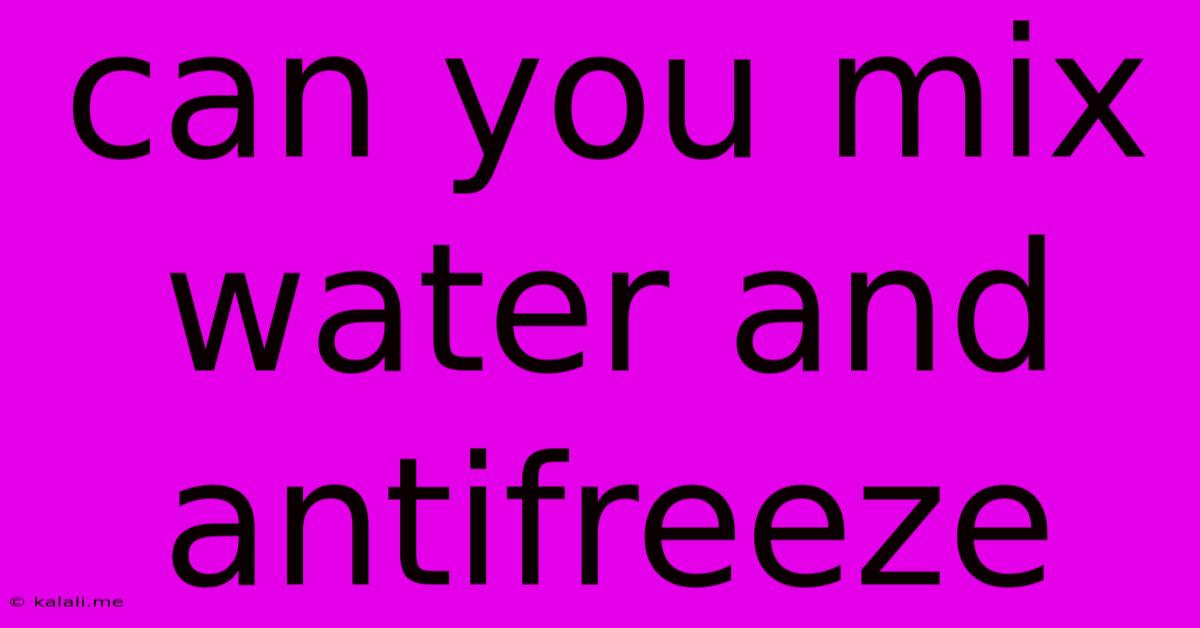Can You Mix Water And Antifreeze
Kalali
Jun 07, 2025 · 3 min read

Table of Contents
Can You Mix Water and Antifreeze? A Comprehensive Guide
Meta Description: Mixing water and antifreeze is crucial for your car's cooling system. This guide explains the ratios, types, and safety precautions for proper mixing, preventing costly engine damage.
Mixing water and antifreeze is a fundamental aspect of car maintenance often overlooked. While seemingly simple, understanding the correct ratios, types of antifreeze, and safety procedures is vital to protecting your engine from overheating and costly repairs. This comprehensive guide will clarify everything you need to know about mixing water and antifreeze.
Why Mix Water and Antifreeze?
Antifreeze, also known as coolant, isn't just about preventing freezing in winter. Its primary function is to regulate engine temperature, preventing overheating, which can cause catastrophic engine damage. Water alone boils at a relatively low temperature, making it inadequate for protecting your engine under high-temperature operating conditions.
Antifreeze, primarily composed of ethylene glycol or propylene glycol, has a much higher boiling point and a lower freezing point than water. When mixed correctly, the resulting solution creates a more effective coolant that:
- Prevents freezing: Protects the engine block from cracking during cold weather.
- Prevents boiling: Maintains optimal engine temperature even during intense operation.
- Inhibits corrosion: Protects engine components from rust and deterioration.
- Lubricates the water pump: Ensures smooth operation of the water pump.
What is the Correct Ratio?
The ideal ratio of water and antifreeze depends on the climate you live in. Consult your vehicle's owner's manual for the manufacturer's recommended mixture. Generally, a 50/50 mix of antifreeze and water is a common recommendation for most climates, offering a balance of freeze and boil protection. However:
- Colder climates: May require a higher concentration of antifreeze (e.g., 60/40 or 70/30 antifreeze to water).
- Warmer climates: Might allow for a slightly lower concentration, but never use pure antifreeze.
Never use pure antifreeze. It lacks the crucial cooling capacity of water and can damage your engine.
Types of Antifreeze: Ethylene Glycol vs. Propylene Glycol
Two primary types of antifreeze exist:
- Ethylene glycol: This is the more common and often less expensive type. However, it's highly toxic and requires careful handling. Avoid skin contact and keep it away from pets and children.
- Propylene glycol: This is a less toxic alternative that's considered environmentally friendlier. It's generally more expensive but offers similar performance benefits.
Important Note: Never mix different types of antifreeze (e.g., ethylene glycol with propylene glycol). This can lead to chemical reactions that reduce the effectiveness of the coolant and potentially damage your engine. Always stick to the same type recommended by your vehicle's manufacturer.
Safety Precautions When Handling Antifreeze
Antifreeze, especially ethylene glycol, is hazardous. Always follow these safety precautions:
- Wear gloves and eye protection: Prevents skin and eye contact.
- Work in a well-ventilated area: Reduces inhalation of fumes.
- Keep away from children and pets: Antifreeze is highly toxic if ingested.
- Dispose of used antifreeze responsibly: Follow local regulations for proper disposal.
Conclusion: Proper Mixing is Key
Mixing water and antifreeze correctly is crucial for your vehicle's health and longevity. By understanding the correct ratios, choosing the appropriate type of antifreeze, and adhering to safety procedures, you can ensure your engine remains protected from the damaging effects of extreme temperatures and corrosion. Always consult your vehicle's owner's manual for specific recommendations and never hesitate to seek professional assistance if you're unsure about any aspect of the process.
Latest Posts
Latest Posts
-
How To Mount Deck Railing Posts
Jun 07, 2025
-
Best Way To Cut Vinyl Flooring
Jun 07, 2025
-
Why Does Swamp Cooler Moyor Sstop Running Inyermittently
Jun 07, 2025
-
Whose Ear Did Peter Cut Off
Jun 07, 2025
-
How To Plant And Grow Acorns
Jun 07, 2025
Related Post
Thank you for visiting our website which covers about Can You Mix Water And Antifreeze . We hope the information provided has been useful to you. Feel free to contact us if you have any questions or need further assistance. See you next time and don't miss to bookmark.